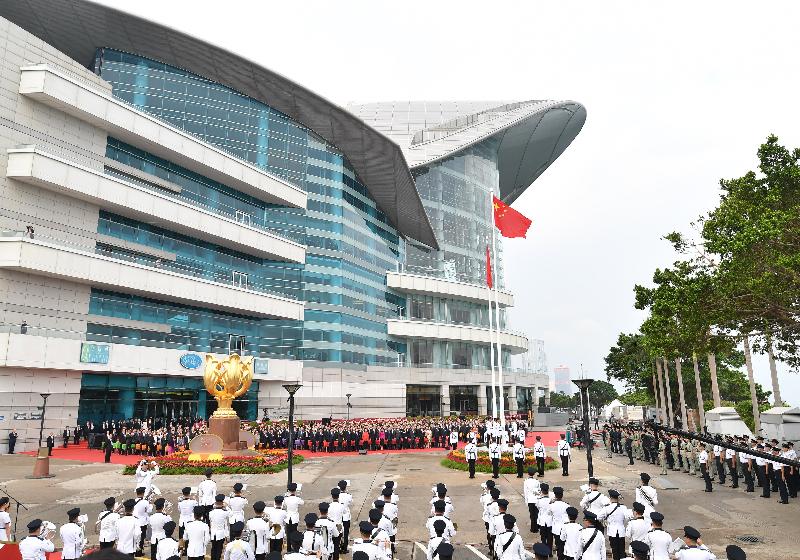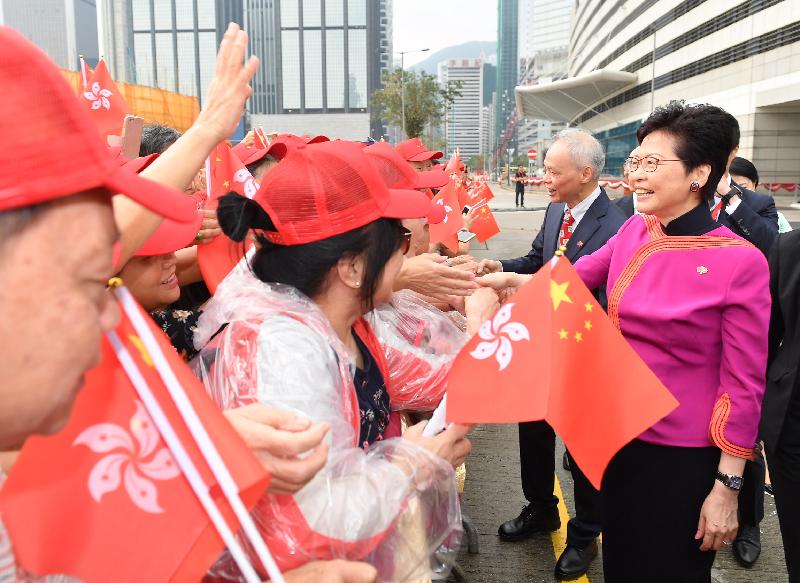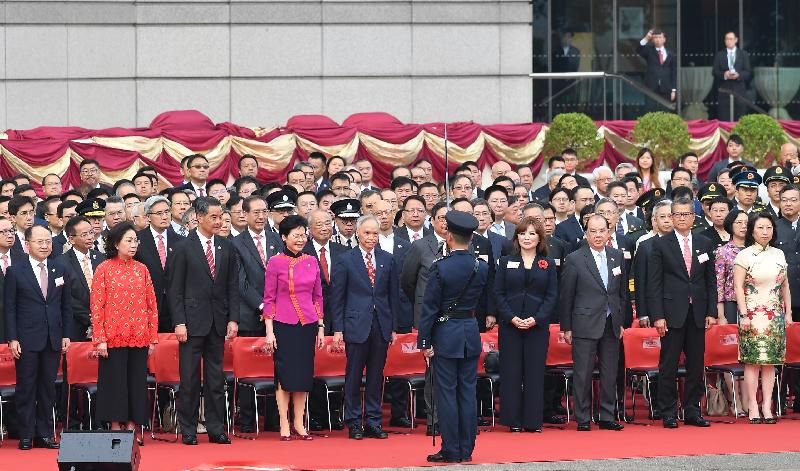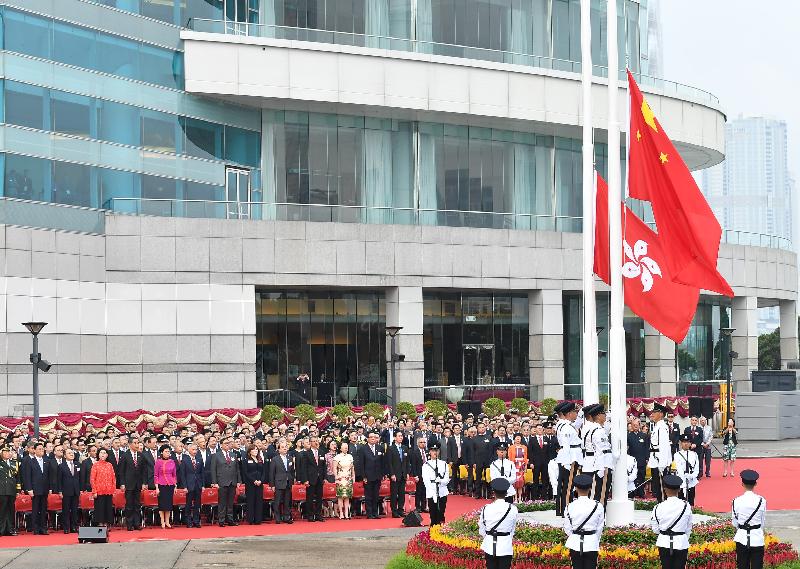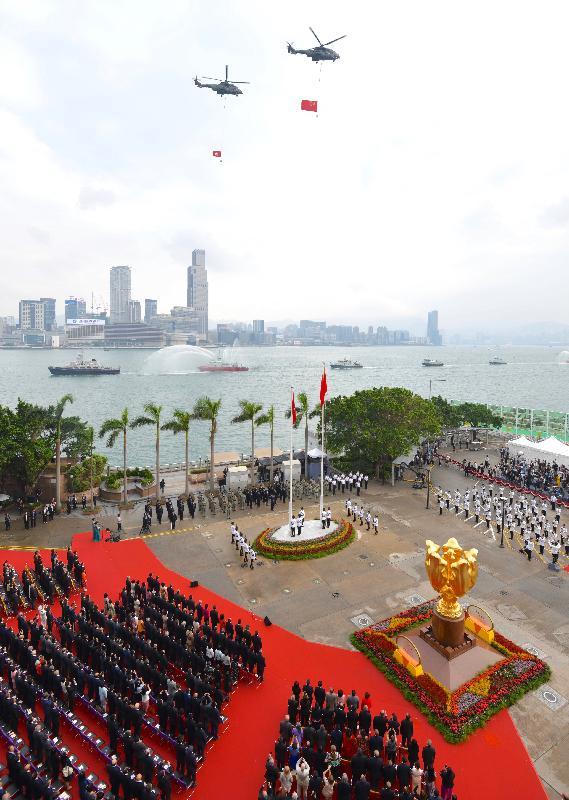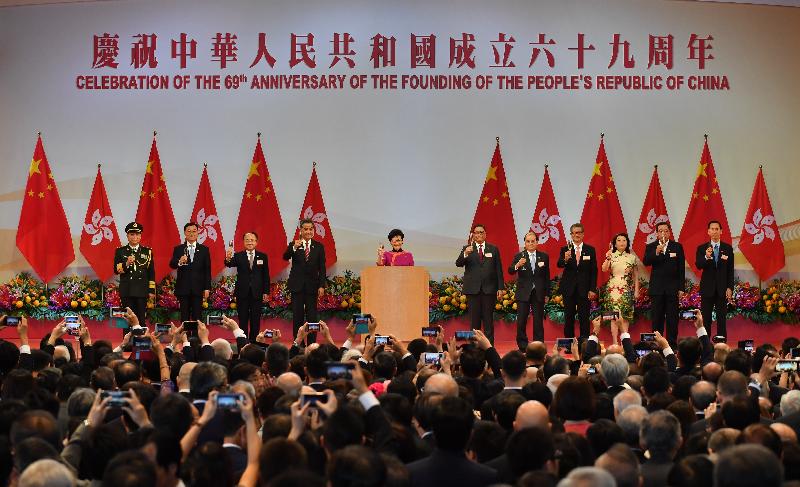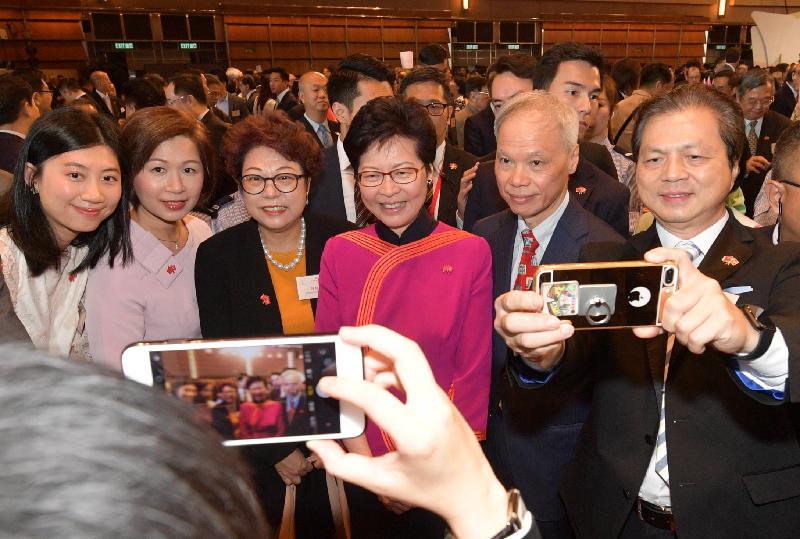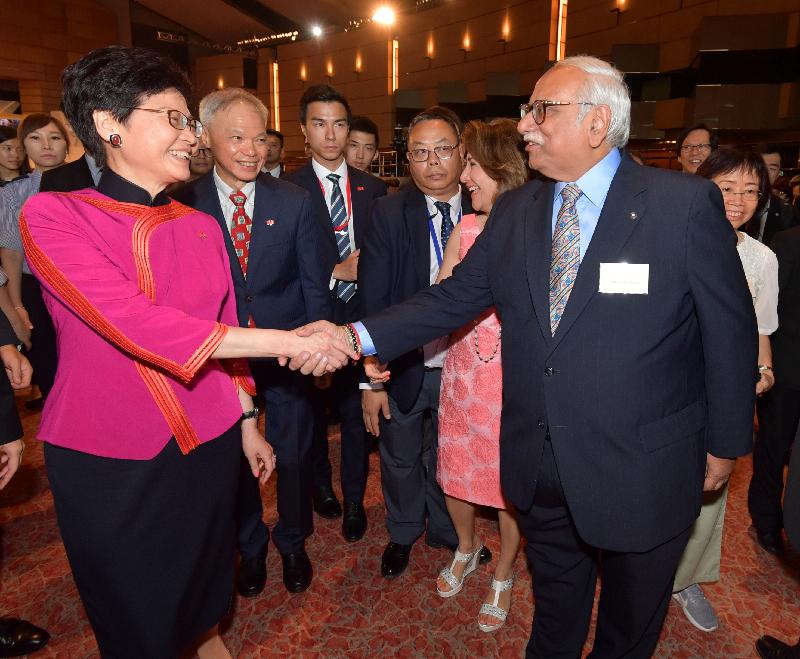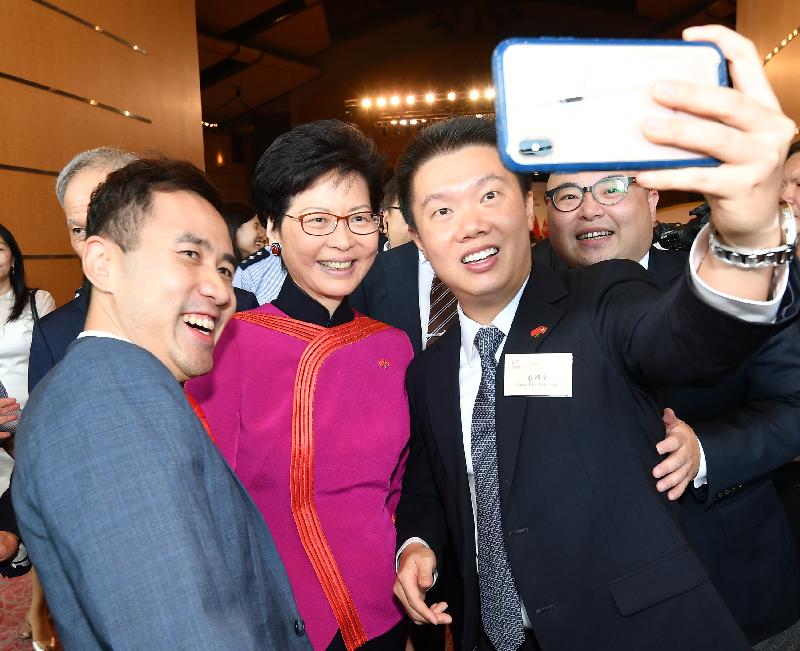Following is the speech (English translation) by the Chief Executive, Mrs Carrie Lam, at the National Day Reception in Celebration of the 69th Anniversary of the Founding of the People's Republic of China today (October 1):
Distinguished guests, fellow citizens,
I am very pleased to celebrate with you today the 69th anniversary of the founding of the People's Republic of China. This annual National Day Reception brings us together to look back on the past development of our motherland and reminisce about the journey we shared with our country. This year's National Day celebration is particularly meaningful as it coincides with the 40th anniversary of the reform and opening up of our country as well as the commissioning of the Hong Kong Section of Guangzhou-Shenzhen-Hong Kong Express Rail Link eight days ago after years of preparation.
Over the past four decades, we have witnessed our country's tremendous achievements in economic and social development. Today, China is the world’s second largest economy, largest industrial manufacturer, largest goods trader and largest foreign exchange reserve holder. In these 40 years, China's total import and export value surged by 178 times and its gross domestic product per capita rose from merely about US$200 in 1978 to over US$8,000 today. Not only has people's livelihood improved significantly, China has also become a key stabiliser and driving engine for global economic growth.
Hong Kong has been playing the role of a "contributor" as well as a "beneficiary" in China's reform and opening up. In the early days of our country's reform and opening up, a large number of Hong Kong businessmen and entrepreneurs were the first to invest in the Mainland of China. The then China's window to the world, Hong Kong kept making use of its strengths, contributing its capital, talent and management system to the country. Meanwhile, Hong Kong manufacturers moved their production lines northward to the Pearl River Delta region to seize the opportunities presented by the rapid growth of the Mainland’s manufacturing industry. This paved the way for Hong Kong’s successful transformation into an important bridge linking the Mainland and the global market, and enabled Hong Kong to establish and reinforce its present position as an international commercial, logistics, shipping, financial and professional service centre. In these 40 years, Hong Kong has been leveraging its advantages to serve the country’s needs, developing jointly and sharing prosperity with the country.
Backed by the motherland and open to the world, Hong Kong enjoys a host of favourable conditions and unique advantages. As our country is entering a new historical era, Hong Kong must keep reinforcing and enhancing its global competitiveness, proactively seize the opportunities arising from the Belt and Road Initiative and the Development of the Guangdong-Hong Kong-Macao Greater Bay Area (Greater Bay Area), as well as better integrate into the overall development of the country and make plans for the future with the support of the Central Government. In this past year, I could deeply feel the Central Government’s cordial care and staunch support for the people of Hong Kong.
To begin with, when President Xi Jinping paid an inspection visit to Hong Kong last year, he mentioned that the relevant Central Government departments would actively consider adopting concrete measures to facilitate Hong Kong people to study, work and live in the Mainland, and provide more opportunities for them to pursue career development on the vast Mainland. Following that, I witnessed the promulgation of two batches of facilitation measures during my visits to Beijing in August and December last year, covering the areas of education, employment, housing, travel, etc. In August this year, the Regulations for Application of Residence Permit for Hong Kong, Macao and Taiwan Residents was announced, meeting the aspirations of a large number of Hong Kong people who usually reside in the Mainland to enjoy rights, public services and facilitation measures in their usual place of residence.
On August 15 this year, I attended, as a member, the first plenary meeting of the leading group for the development of the Greater Bay Area chaired by Vice Premier of the State Council, Mr Han Zheng. The leading group is a top-tier body to advance the development of the Greater Bay Area and strengthen its co-ordination. It has recognised and supported Hong Kong's work on developing the Greater Bay Area into an international technology and innovation hub. The Innovation and Technology Bureau of the Hong Kong Special Administrative Region (HKSAR) Government also signed a co-operation arrangement with the Ministry of Science and Technology last month to promote exchanges and collaboration on science and technology. One such important initiative is the opening up of science and technology project funding for application by Hong Kong research institutions announced by the Ministry of Science and Technology and the Ministry of Finance, as personally instructed by President Xi. This new policy has realised cross-boundary portability of R&D funding to Hong Kong.
In November and December last year, we also successively signed the Agreement between the Mainland and HKSAR on Enhancing the Arrangement for Closer Cultural Relations with the Ministry of Culture and Tourism and the Arrangement for Advancing Hong Kong's Full Participation in and Contribution to the Belt and Road Initiative with the National Development and Reform Commission. These arrangements have provided Hong Kong with more opportunities to participate in the country’s development. For instance, the Ministry of Culture and Tourism arranged and sponsored 30 children from Hong Kong to perform Chinese opera in Beijing this summer. Their performance was well-received by the audience. For the Belt and Road Initiative, the HKSAR Government successfully held the seminar on "Strategies and Opportunities under the Belt and Road Initiative – Leveraging Hong Kong's Advantages, Meeting the Country’s Needs" in co-operation with the Belt and Road General Chamber of Commerce at the Great Hall of the People in Beijing on February 3 this year. With the support of the State-owned Assets Supervision and Administration Commission (SASAC) of the State Council, we made connections with over 170 state-owned enterprises in the seminar. After that, the Commerce and Economic Development Bureau of the HKSAR Government as well as the Hong Kong Monetary Authority organised two sharing sessions in Hong Kong in collaboration with the SASAC to encourage state-owned enterprises to make further use of Hong Kong’s professional services as a platform for participating in the Belt and Road Initiative.
The current-term Government attaches great importance to youth development and our work in this area is also supported by the Central Government and the relevant organisations. During the past year, arrangements were made for over 17 000 young people to participate in exchange and internship programmes in the Mainland. Seventy of them took part in the thematic internship programmes jointly organised by the HKSAR Government and the Beijing Palace Museum, Dunhuang Academy, Sichuan Wolong Nature Reserve and Chinese Academy of Sciences. I also met some of these young people during my visit to Beijing.
Our work in all these areas, which is strongly supported by the Central Government, has created new areas of growth for Hong Kong's economy, opened up an even larger market for Hong Kong's professional services, as well as provided more opportunities for Hong Kong's young people to pursue their careers. These are indeed Hong Kong's unique advantages under "One Country, Two Systems". For such work to flourish and bear fruit, as for a tree to grow tall and luxuriant, its roots must run deep and strong. In his important address at the Inaugural Ceremony of the Fifth-Term Government of the HKSAR on July 1 last year, President Xi Jinping clearly reminded us that it is imperative to have a correct understanding of the relationship between "One Country" and "Two Systems". He said, '"One Country" is like the roots of a tree. For a tree to grow tall and luxuriant, its roots must run deep and strong. The concept of "One Country, Two Systems" was advanced, first and foremost, to realise and uphold national unity. In the negotiations with the United Kingdom, we made it categorically clear that sovereignty is not for negotiation. Now that Hong Kong has returned to China, it is all the more important for us to firmly uphold China's sovereignty, security and development interests. In practice, we must establish a strong sense of "One Country", firmly observe the principle of "One Country" and correctly handle the relationship between the HKSAR and the Central Government.' Today, as we celebrate the National Day, let us not forget the original spirit of "One Country, Two Systems" but bear in mind the mission of upholding our country's sovereignty, security and development interests. Let us develop jointly and share prosperity with our country and embrace a brighter future together.
I wish our motherland continued prosperity and progress, Hong Kong social harmony and stability, and everyone a joyous celebration.
Follow this news feed: East Asia







